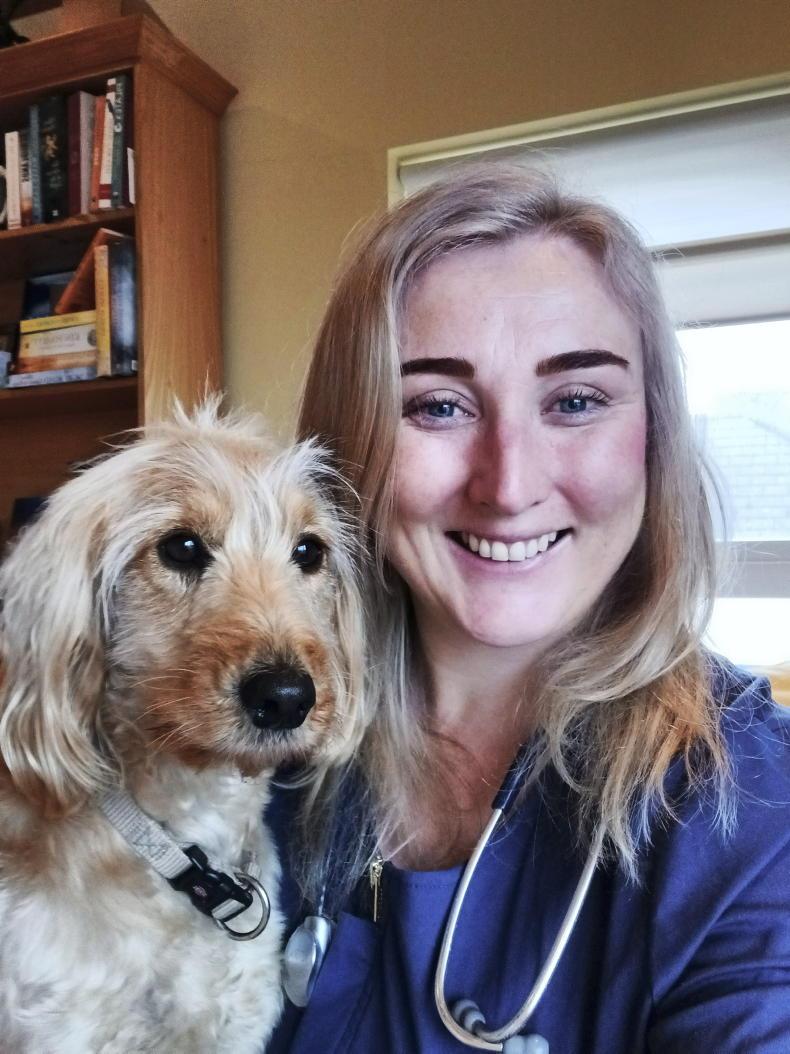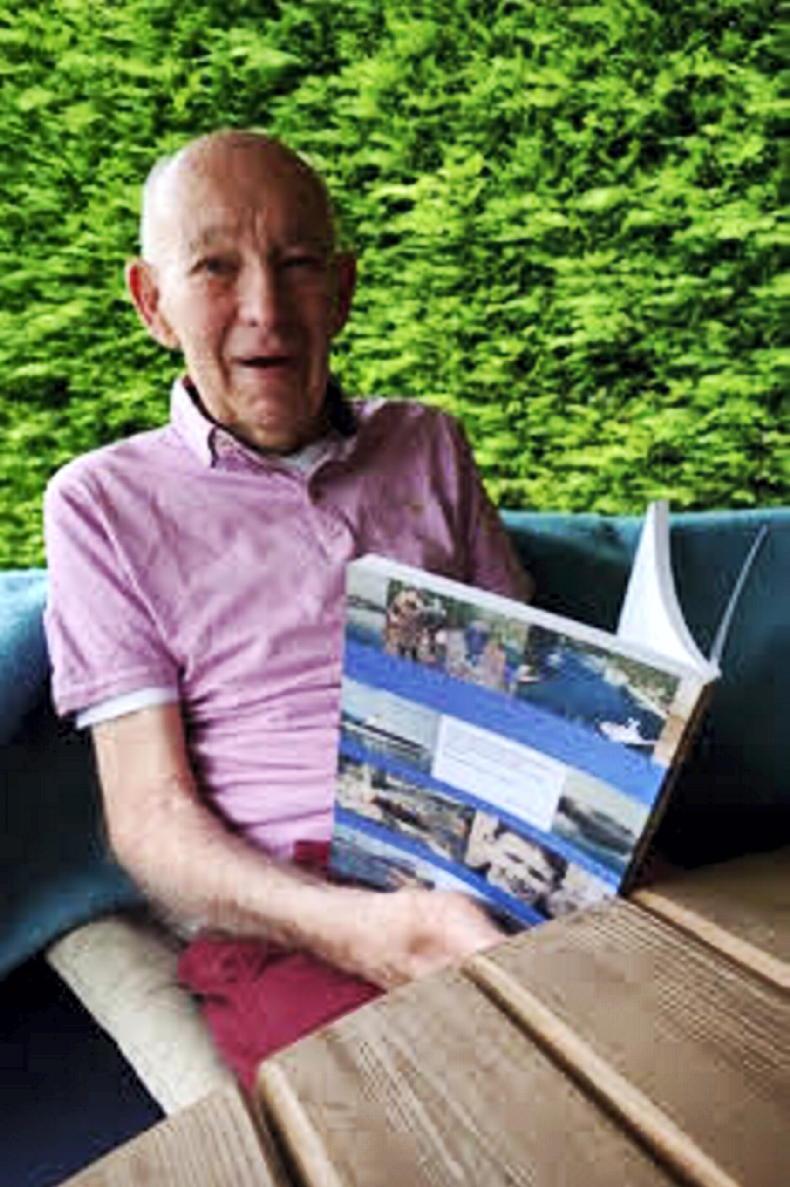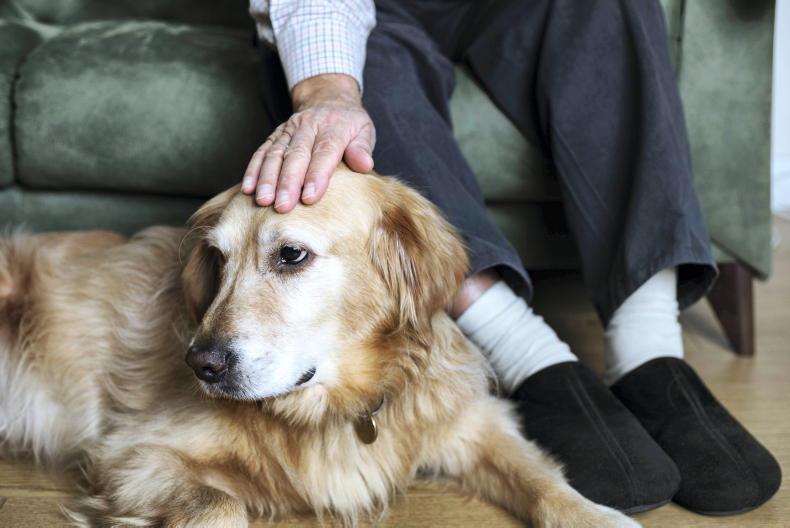Yvonne Drought is from Arthurstown in Co Wexford, and is a veterinary surgeon based in Carrick-on-Suir, Co Tipperary. She became aware of a few unusual symptoms in the months prior to being diagnosed with ovarian cancer.
“I was in the final year of my veterinary degree in University College Dublin (UCD) when I noticed that I was urinating a lot,” she says.
“I also found that when I was bending over to get in and out of kennels I felt uncomfortable and when I ate my dinner in the evening, instead of feeling ‘normal full’ I felt as if I had made an absolute savage of myself – a Christmas dinner kind of full feeling – even though I only had a normal amount of food.”
Yvonne’s GP referred her for an ultrasound scan and a huge cyst – the size of a melon – was found on her ovary.

Yvonne Drought is a veterinary surgeon based in Carrick-on-Suir, Co Tipperary.
“They were worried it was going to burst so I was booked in for surgery straight away,” she says. “The 2kg weight of a thing with a solid structure in the middle was removed and no one was thinking that it might be cancerous, initially, but I had just gone back to UCD on 4 January on work placement when I got a call from my consultant asking me to come in the following morning as the lab results were back.
“I knew immediately it must be cancer, or she wouldn’t be ringing me.”
Chemotherapy was prescribed for Yvonne at first and she duly set about moving home to Wexford and organising herself to have this treatment in nearby University Hospital Waterford (UHW) rather than be living on her own in Dublin during that time.
“Some time later it was decided, however, that I didn’t actually need chemotherapy,” she says, “as the surgery had removed the tumour within the cyst but the whole event, when I thought I would be having chemo, made me think about pets and about what precautions you should take around them if you are immune system is low.
“I didn’t know if I should even have a dog in the house,” she continues. “I was asking, ‘How does it work if you are having chemo and are immunocompromised and you have pets?’ What if you were a farmer and had cancer? What precautions should you be taking to avoid infection? Because there wasn’t much guidance out there about this, I decided that, when I got college finished, I would write a leaflet about this topic for the Irish Cancer Society.”
Yvonne’s two leaflets entitled Your cancer treatment and pets and Your cancer treatment and farm animals can be downloaded from the Irish Cancer Society website.
“I wanted to write something really practical and straightforward that would be helpful to people who had been recently diagnosed,” she says. “A pet can be a great source of comfort and companionship following a cancer diagnosis but if you have a weak immune system these suggestions may be useful in relation to care around them.”
Yvonne’s recommendations:Pets
Don’t kiss your dog or cat on the mouth or allow them to lick your face.Wash your hands thoroughly after contact with your pet.Avoid emptying your cat’s litter tray or picking up dog poo. If this cannot be avoided, make sure you wear disposable gloves – especially if your pet has diarrhoea.Make sure your dog or cat is up to with their vaccinations, worming and tick and flea treatments before you start your cancer treatment.Have your dog or cat groomed and nails cut before you have treatment. Keeping nails short helps avoid accidental scratches.Have a dog walker or family member on standby to walk your dog, for times when you may not feel up to it.Farm animals
Because livestock all naturally carry disease organisms which could spread to humans, control measures such as wearing personal protective equipment (PPE) and hand washing are required to reduce any risk of infection.
There are a number of pathogens (substances that can cause disease, such as bacteria and viruses) found in animal waste. These pathogens can cause severe disease in people with a weak immune system. Campylobacter, Cryptosporidium and E.coli may be found in scouring young stock and older stock may shed Salmonella bacteria.
Here are some of Yvonne’s suggestions:
Wash your hands thoroughly and regularly after handling farm animals or fences, buckets and bedding.Wear PPE when opening old silage bales, mouldy hay or grain to avoid breathing in dust and spores. Avoid animals that are scouring – and their bedding – where possible. Change out of work clothes and shoes before going into your home to avoid spreading infection inside the home. Yvonne is doing well now but still attends for her quarterly medical check-ups.
“Everything has been all clear so far, thank goodness,” she says.
The leaflets were written in conjunction with Assistant Professor Eoin Ryan, School of Veterinary Medicine, UCD and Dr Paula Calvert, Consultant Medical Oncologist, UHW and the Irish Cancer Society.
Having a pet is good for you!Having a pet has health benefits. A recent review of seventeen research papers on the benefits of owning pets highlighted that having contact with pets is good for one’s physical and mental health. Some of the benefits include stabilising blood pressure, relaxation and reducing loneliness and isolation.
Men’s health week 2021
Time to check in, check up and check it out
International Men’s Health Week (MHW) runs from Monday 14th until Sunday 20th June 2021 but why is there a need to hold a Men’s Health Week in Ireland?
Males constitute almost 50% of the population on the island of Ireland and, therefore, deserve to have a gender lens focused upon their specific health needs. Research clearly shows that men experience a disproportionate burden of ill-health which can lead to early death.
Men die younger than women do.Males have higher death rates than females for almost all of the leading causes of death and at all ages.Men’s poorer lifestyles are responsible for a high proportion of chronic diseases.Late presentation to health services can lead to a large number of problems becoming untreatable.While many of these conditions are preventable, their prevalence amongst men may, in fact, rise in the future. Men’s Health Week 2021 will, once again, take place against a backdrop of the COVID-19 pandemic. Worldwide, this virus continues to have a major and disproportionate impact upon men’s health as well as their wider lives. Even with the hope of vaccination, these are still extremely challenging times.
However, one thing is sure: we all need to focus upon rebuilding our relationships with family, friends, neighbours, work colleagues, community groups, clubs, churches, men’s programmes, sporting bodies and health services.
Men’s Health Week 2021 offers an ideal time to think about how this could be done realistically and safely. Throughout the week, everyone is asked to begin the process of “making the connections” and to follow the call to action which is:
CHECK IN with yourself to see how you are coping/feeling, and to identify any health worries that you might have.
CHECK UP on your family, friends, neighbours, colleagues to see how they’re doing and to offer support.
If you notice anything worrying or which needs medical attention, CHECK IT OUT and seek information/help/support/treatment as soon as possible.
The celebration of Men’s Health Week on the island of Ireland is funded by the Health Service Executive Health and Wellbeing and the Public Health Agency
Voice gone but still plenty to saySome readers may remember an article in our health pages about Dr Noel Kavanagh published back in March 2020. 
It told of his impressive career as a vet, developer of animal vaccines, a contributor to international publications and conferences and of his competitive sports history in rugby, hockey, athletics, squash, golf, as well as racing motorcycles and Formula One cars. Boating has been a huge interest too for him and his wife Caroline and daughters Kirsten and Naomi.
Life became very difficult for Noel, however, when he was diagnosed with Motor Neurone Disease (MND) in 2018 on his 73rd birthday. He started to write his autobiography then, and against all odds completed it in April 2021. This book shares his life over the last three years. While his voice may be gone, he is still alive and has plenty to say that is worth reading. Proceeds from the sale of this valuable book will go to support Research Motor Neurone (RMN).
The book From Living the Dream to Living with MND: A Race against Time by Noel Kavanagh costs €20 and can be ordered online.
Yvonne Drought is from Arthurstown in Co Wexford, and is a veterinary surgeon based in Carrick-on-Suir, Co Tipperary. She became aware of a few unusual symptoms in the months prior to being diagnosed with ovarian cancer.
“I was in the final year of my veterinary degree in University College Dublin (UCD) when I noticed that I was urinating a lot,” she says.
“I also found that when I was bending over to get in and out of kennels I felt uncomfortable and when I ate my dinner in the evening, instead of feeling ‘normal full’ I felt as if I had made an absolute savage of myself – a Christmas dinner kind of full feeling – even though I only had a normal amount of food.”
Yvonne’s GP referred her for an ultrasound scan and a huge cyst – the size of a melon – was found on her ovary.

Yvonne Drought is a veterinary surgeon based in Carrick-on-Suir, Co Tipperary.
“They were worried it was going to burst so I was booked in for surgery straight away,” she says. “The 2kg weight of a thing with a solid structure in the middle was removed and no one was thinking that it might be cancerous, initially, but I had just gone back to UCD on 4 January on work placement when I got a call from my consultant asking me to come in the following morning as the lab results were back.
“I knew immediately it must be cancer, or she wouldn’t be ringing me.”
Chemotherapy was prescribed for Yvonne at first and she duly set about moving home to Wexford and organising herself to have this treatment in nearby University Hospital Waterford (UHW) rather than be living on her own in Dublin during that time.
“Some time later it was decided, however, that I didn’t actually need chemotherapy,” she says, “as the surgery had removed the tumour within the cyst but the whole event, when I thought I would be having chemo, made me think about pets and about what precautions you should take around them if you are immune system is low.
“I didn’t know if I should even have a dog in the house,” she continues. “I was asking, ‘How does it work if you are having chemo and are immunocompromised and you have pets?’ What if you were a farmer and had cancer? What precautions should you be taking to avoid infection? Because there wasn’t much guidance out there about this, I decided that, when I got college finished, I would write a leaflet about this topic for the Irish Cancer Society.”
Yvonne’s two leaflets entitled Your cancer treatment and pets and Your cancer treatment and farm animals can be downloaded from the Irish Cancer Society website.
“I wanted to write something really practical and straightforward that would be helpful to people who had been recently diagnosed,” she says. “A pet can be a great source of comfort and companionship following a cancer diagnosis but if you have a weak immune system these suggestions may be useful in relation to care around them.”
Yvonne’s recommendations:
Pets
Don’t kiss your dog or cat on the mouth or allow them to lick your face.Wash your hands thoroughly after contact with your pet.Avoid emptying your cat’s litter tray or picking up dog poo. If this cannot be avoided, make sure you wear disposable gloves – especially if your pet has diarrhoea.Make sure your dog or cat is up to with their vaccinations, worming and tick and flea treatments before you start your cancer treatment.Have your dog or cat groomed and nails cut before you have treatment. Keeping nails short helps avoid accidental scratches.Have a dog walker or family member on standby to walk your dog, for times when you may not feel up to it.Farm animals
Because livestock all naturally carry disease organisms which could spread to humans, control measures such as wearing personal protective equipment (PPE) and hand washing are required to reduce any risk of infection.
There are a number of pathogens (substances that can cause disease, such as bacteria and viruses) found in animal waste. These pathogens can cause severe disease in people with a weak immune system. Campylobacter, Cryptosporidium and E.coli may be found in scouring young stock and older stock may shed Salmonella bacteria.
Here are some of Yvonne’s suggestions:
Wash your hands thoroughly and regularly after handling farm animals or fences, buckets and bedding.Wear PPE when opening old silage bales, mouldy hay or grain to avoid breathing in dust and spores. Avoid animals that are scouring – and their bedding – where possible. Change out of work clothes and shoes before going into your home to avoid spreading infection inside the home. Yvonne is doing well now but still attends for her quarterly medical check-ups.
“Everything has been all clear so far, thank goodness,” she says.
The leaflets were written in conjunction with Assistant Professor Eoin Ryan, School of Veterinary Medicine, UCD and Dr Paula Calvert, Consultant Medical Oncologist, UHW and the Irish Cancer Society.
Having a pet is good for you!Having a pet has health benefits. A recent review of seventeen research papers on the benefits of owning pets highlighted that having contact with pets is good for one’s physical and mental health. Some of the benefits include stabilising blood pressure, relaxation and reducing loneliness and isolation.
Men’s health week 2021
Time to check in, check up and check it out
International Men’s Health Week (MHW) runs from Monday 14th until Sunday 20th June 2021 but why is there a need to hold a Men’s Health Week in Ireland?
Males constitute almost 50% of the population on the island of Ireland and, therefore, deserve to have a gender lens focused upon their specific health needs. Research clearly shows that men experience a disproportionate burden of ill-health which can lead to early death.
Men die younger than women do.Males have higher death rates than females for almost all of the leading causes of death and at all ages.Men’s poorer lifestyles are responsible for a high proportion of chronic diseases.Late presentation to health services can lead to a large number of problems becoming untreatable.While many of these conditions are preventable, their prevalence amongst men may, in fact, rise in the future. Men’s Health Week 2021 will, once again, take place against a backdrop of the COVID-19 pandemic. Worldwide, this virus continues to have a major and disproportionate impact upon men’s health as well as their wider lives. Even with the hope of vaccination, these are still extremely challenging times.
However, one thing is sure: we all need to focus upon rebuilding our relationships with family, friends, neighbours, work colleagues, community groups, clubs, churches, men’s programmes, sporting bodies and health services.
Men’s Health Week 2021 offers an ideal time to think about how this could be done realistically and safely. Throughout the week, everyone is asked to begin the process of “making the connections” and to follow the call to action which is:
CHECK IN with yourself to see how you are coping/feeling, and to identify any health worries that you might have.
CHECK UP on your family, friends, neighbours, colleagues to see how they’re doing and to offer support.
If you notice anything worrying or which needs medical attention, CHECK IT OUT and seek information/help/support/treatment as soon as possible.
The celebration of Men’s Health Week on the island of Ireland is funded by the Health Service Executive Health and Wellbeing and the Public Health Agency
Voice gone but still plenty to saySome readers may remember an article in our health pages about Dr Noel Kavanagh published back in March 2020. 
It told of his impressive career as a vet, developer of animal vaccines, a contributor to international publications and conferences and of his competitive sports history in rugby, hockey, athletics, squash, golf, as well as racing motorcycles and Formula One cars. Boating has been a huge interest too for him and his wife Caroline and daughters Kirsten and Naomi.
Life became very difficult for Noel, however, when he was diagnosed with Motor Neurone Disease (MND) in 2018 on his 73rd birthday. He started to write his autobiography then, and against all odds completed it in April 2021. This book shares his life over the last three years. While his voice may be gone, he is still alive and has plenty to say that is worth reading. Proceeds from the sale of this valuable book will go to support Research Motor Neurone (RMN).
The book From Living the Dream to Living with MND: A Race against Time by Noel Kavanagh costs €20 and can be ordered online.









 This is a subscriber-only article
This is a subscriber-only article









SHARING OPTIONS: